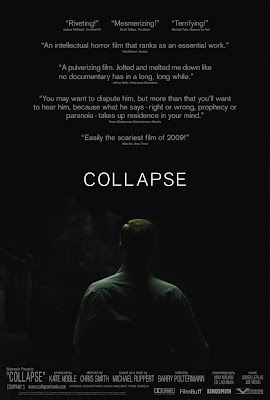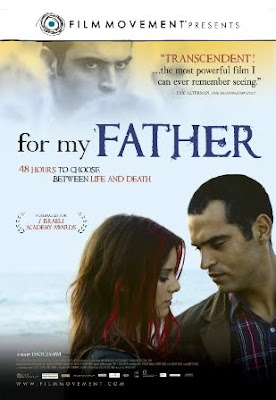For My Father (Film Movement)
Release date: June 1
Standard list price: $22.49
I normally reserve the space for the largest review in this column to wonderful films that are worthy of your time, but occasionally a film so indefensible – so patently contemptible – will arrive on my doorstep that it prompts the need to vent for more than 150 words. For My Father, the latest installment in the usually reliable Film Movement line, is one such title.
“There have been so many films, documentary and fiction, about the Israeli-Palestinian conflict that, sight unseen, ’For My Father’ could seem like just another tired vision of this unfortunate problem,” says a Film Movement representative in the DVD’s liner notes before explaining why the movie is better than all that. On the contrary: If only For My Father represented such a benign, forgettable homogeny with other movies about Middle Eastern strife, it could have been absorbed and digested without much criticism. For My Father is different, all right – but for all the wrong reasons.
Though shot in Israel and filmed in Hebrew, For My Father is as close to the art house as Transformers. The film opens on Tarek (Shredi Jabarin), a wannabe suicide bomber, being picked up by two terrorist buddies who strap explosives to his chest and discuss protocol – i.e., don’t explode yourself until you’re in a crowd of people, etc. Then comes the pep talk right out of a Hollywood action movie: “We don’t have an air force, Tarek. If we had an air force, we wouldn’t have to do this. You’re our air force.”
Sounds trailer-ready, doesn’t it? This kind of artificial nonsense also sounds disgustingly maudlin and completely inappropriate, but it speaks to Tarek’s indecisiveness. According to the film’s (il)logic, radical Islamic suicide bombers are just like you and me – they need a little coaxing. It’s a big day, after all!
This scene is, unfortunately, of a piece with the rest of this ludicrous picture. The unintentional absurdity continues when Tarek’s bomb fails, leaving him stranded in Tel Aviv while a local repairman fixes his doomsday switch. All the while, the jihadist thugs are on his case: They’ve wired a fail-safe cellphone to Tarek’s body, threatening to activate his explosives remotely if and when he can’t do the job himself. They give him 48 hours, during which time Tarek realizes that there’s some nice people in Israel; he works under a kind shopkeeper and forms a friendship with an unorthodox and slightly retarded girl.
That a suicide bomber can, or would, ever have a “change of heart” and decide to embrace love rather than hate, is a dangerously naïve Hollywood fantasy whose rosy vision is insulting to everyone’s intelligence – even suicide bombers themselves. Though Bill Maher lost a job admitting it, anyone who has done the most basic research about Islamic suicide bombers knows that these men are not hesitant, cold-footed cowards who would forego jihad at the slightest resistance. They are dyed-in-the-wool religious fundamentalists who would, in the name of Allah, love nothing more than to sacrifice their earthly bodies while obliterating their enemies so they can properly ascend to heaven and fornicate with 72 virgins.
For My Father suggests otherwise and, making the whole affair even more offensive, suggests so through a filmic grammar of Hollywood clichés – a pop song-scored lovers’ bike ride, the sharing of headphones on the beach, Tarek’s heroic dispatching of a ridiculous band of Orthodox thugs threatening his new girlfriend for not being dogmatic.
The screenplay feels written by a Hollywood hack with no understanding of life in Israel, and we can only blame the translators to a point. This melodramatic pap is so utterly disingenuous that it makes me wonder if the whole thing isn’t a joke played on us, the spectators – a kind of Israeli Lady in the Water, subtextually subverting stereotypes by obviously overplaying them to the point of parody. If director Dror Zahavi wants his film to have any credibility at all, I’d suggest he frame it this way.

Mary and Max (IFC)
Release date: June 15
SLP: $18.99
This claymation feature by Australian writer-director Adam Elliot has been a favorite at dozens of film festivals since its 2009 Sundance premiere, and it’s easy to see why. Toni Collette voices Mary Daisy Dinkle, a lonely and peculiar girl living in the suburbs of Melbourne in the late ‘70s who, through a random search through a phone book, writes a letter to Philip Seymour Hoffman’s Max Horovitz, an overweight, anxiety-addled New Yorker with Asperger’s syndrome (has there ever been a character more tailored to Hoffman’s outcast onscreen persona?). Thus a pen-pal relationship is formed, and it’s as unconventional as the movie’s style. The film’s episodic script follows one letter with another, punctuated every now and then with Barry Humphries’ gravitas-laden fairy tale narration; there is very little verbal communication between characters. An adult animated film all the way, Mary and Max explores some awfully dark terrain, from alcoholism and depression to obesity, suicide, electroshock therapy and oodles of death. But the bizarre, surrealist sense of humor and hilarious visual whimsy – recalling The Ricky Gervais Show – keep even the most morbid elements in comedic check. Ultimately, Mary and Max is a fine picture about friendship, forgiveness and overcoming fear and anxiety.

Cinema Pride Collection (Fox)
Release date: June 8
SLP: $44.99
Gays and lesbians have come a long way in the modern media, emerging from decades of showbiz demonization, caricature and insensitivity to claim their own radio and TV stations, film festivals and niche movie theaters. So it was surprising to learn that Fox’s new Cinema Pride collection is the very first LGBT box set released by a major motion picture studio. The long wait for such a collection is most likely due to Fox’s dragging its feet until it could tie the DVDs in with Gay and Lesbian Pride Month. It’s smart marketing, and at least we have this set now. The 10-disc collection includes mostly worthy titles: La Cage Aux Folles and its lesser remake The Birdcage, Stephen Frears’ wonderful My Beautiful Laundrette, The Children’s Hour, The Adventures of Priscilla, Queen of the Desert, Bent, Boys Don’t Cry, Kissing Jessica Stein and a couple of throwaway titles that probably shouldn’t be included in any collection, LGBT or otherwise: The Object of My Affection and Imagine Me & You. 
Collapse (MPI)
Release date: June 15
SLP: $16.49
American Movie director Chris Smith made this exhaustive interview film in the stylistic vein of Errol Morris’ The Fog of War. His subject is Michael Ruppert, a police officer turned investigate journalist whose radical theories, published in his From the Wilderness newsletter, led to his marginalization from the mainstream media and, he says with pride, made him a personal enemy of Dick Cheney and Donald Rumsfeld. But this eloquent, erudite conspiracist, doom prophet and major buzzkill foretold many catastrophes – mainly surrounding the 2008 financial collapse and its ripple effects –and he has profound observations about our overreliance on oil, the eventual demise of what he calls our “fiat currency” of printed money, our diminishing resources and our political structure, which he considers as antiquated as the Jurassic period. It’s too bad Ruppert goes well beyond rational thought and into crackpot forecasting about shifting paradigms and our inevitable extinction as a human race (he deploys the word “perish” with newscaster gravitas) if we don’t abandon our cars, grow our own food, pee on our soil, etc. It’s a fascinating, endlessly watchable movie nonetheless, and Smith, to his credit, challenges Ruppert from time to time rather than let him bloviate.
